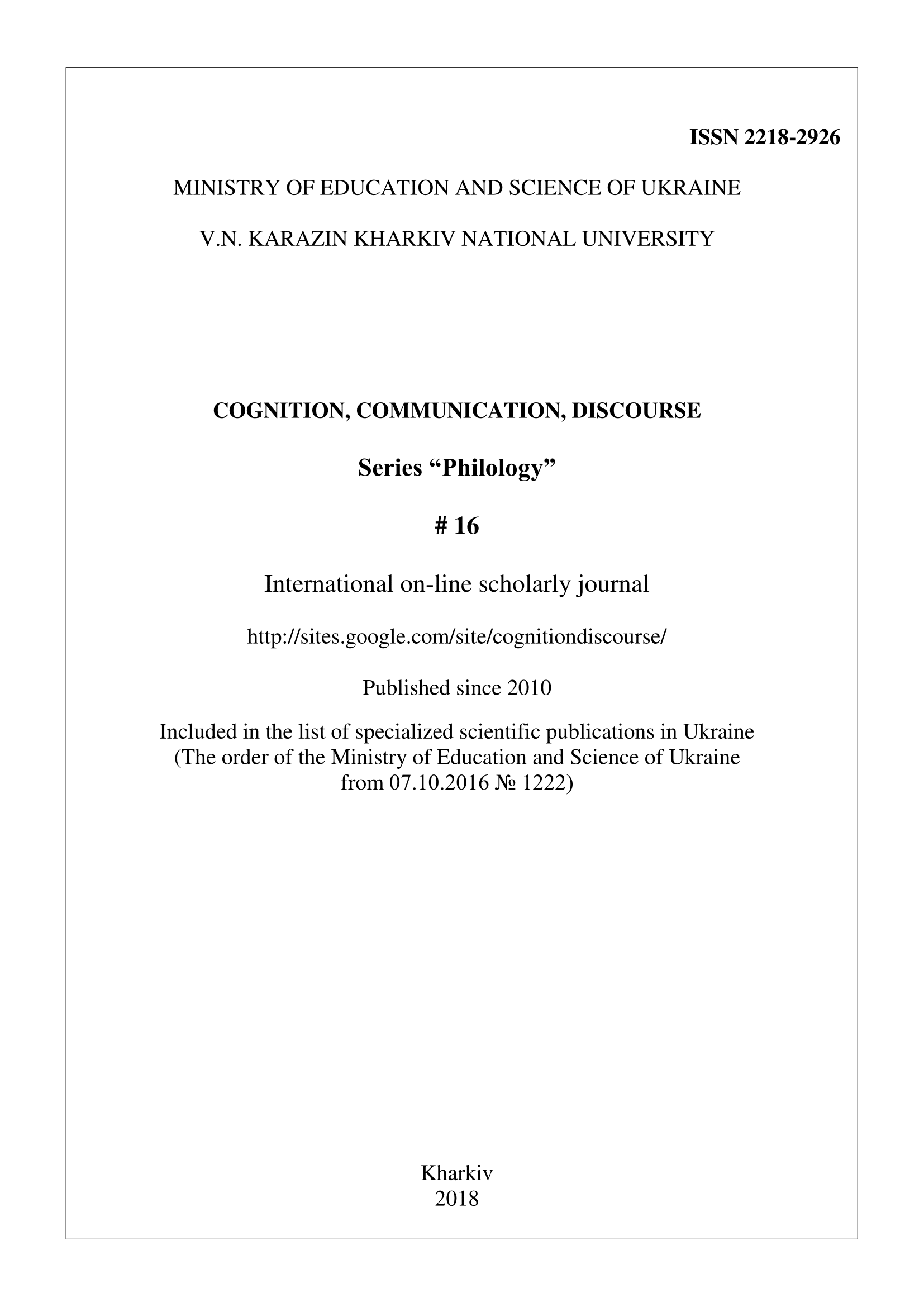Translation as a means of constructing cultures: philosophical foregrounding
Abstract
The aim of the article is to portray translation as a means of constructing cultures in terms of philosophy. Proceeding from the idea that cultural enrichment occurs due to the translation of not only literary works, but also ideas, traditions, way of living, etc., the hypothesis was put forward that philosophical description and analysis of translation should be carried out on the basis of two interwoven phenomena – culture and creativeness. Methodology of the article is determined by general humanitarian principles of interdisciplinarity (use of methods and theories of such correlated disciplines as cultural studies, translation studies, philosophy), anthropocentrism (emphasis on the agent of action as a focal point of translation process), and poliparadigmatism (combination of provisions of classical structural and modern cognitive paradigms resulting in the complex character of the research). Scientific novelty of the research is determined by obtaining some new information concerning the role of translation as a means of (self)cognition / (self)reflection; individual and collective development; and shaping cultural continuum. Innovative approach to translation allows to come to a more profound philosophical understanding of this phenomenon going beyond its linguistic and/or communicative essence and to appreciate its significance for creative self-improvement of all the involved individuals (author, translator, and recipient) as well as for sustained cultural growth all over the world. Conclusions. Conducted research revealed global creative function of translation that helps establish and develop cultures on a universal scale since the majority of national cultures were constructed in the process and under the influence of translation. In the context of Ukrainian colonial and post-colonial history, the article highlighted the role of translation as a cultural catalyst, transmitter of ideas, and defender of spiritual values.
Downloads
References
Akhiezer, A.S., and Ryabova, M.E. (2005). Social'naja filosofija v uslozhnjajushhemsja mire [Social philosophy in a more complex world]. Obshhestvennye nauki i sovremennost'. – Social sciences and modern life, 3, 137–143 (in Russian)
Avtonomova, N.S. (2008). Poznanie i perevod. Opyty filosofii jazyka [Cognition and translation. Philosophical experience of the language]. Moscow: Rossiyskaya politicheskaya entsiklopediya Publ.
Bevz, N.V. (2011). Pereklad filosofskykh tekstiv u suchasnomu kulturnomu prostori Ukrainy [Translation of philosophical texts in Ukraine’s modern cultural environment]. Visnyk Zhytomyrskoho derzhavnoho universytetu imeni Ivana Franka. Ser.: Filolohichni nauky. – Herald of Ivan Franko Zhytomyr State University. Series: Philology, 56, 38–41 (in Ukrainian)
Bibler, V.S. (1991). Ot naukouchenija – k logike kul'tury (Dva filosofskih vvedenija v dvadcat' pervyj vek) [From the doctrine of science to cultural logic (Two philosophical introductions to the XXI century)]. Moscow: Izd-vo politicheskoy literatury. Available at: http://www.philosophy.ru/library/bibl/bibler.html.
Fokin, S.L. (2011). Perevod kak nezadacha russkoj filosofii: k kritike koncepcii mimesisa V.A. Podorogi [Translation as a Russian philosophy’s bad luck: To the criticism of V.A. Podoroga’s concept of mimesis]. Politicheskaja konceptologija. – Political conceptology, 1, 162–177. Available at: http://politconcept.sfedu.ru/2011.1/11.pdf (in Russian)
Galeeva, N.L. (2006). Perevod v kul'ture: utochnenie statusa i ponjatij [Translation in culture: defining the status and notions]. Kritika i semiotika. – Critics and Semiotics, 9, 24–35 (in Russian)
Horskyi, V.S. (2001). Pereklad yak interpretatsiia po-ukrainsky [Translation as interpretation in Ukrainian]. In V.S. Horskyi (ed.). Filosofiia v ukrainskii kulturi: metodolohiia ta istoriia. Filosofski narysy [Philosophy in Ukrainian culture: methodology and history. Philosophical essays]. Kyiv: Tsentr praktychnoi filosofii Publ., pp. 54–61
Jakobson, R. On linguistic aspects of translation. Available at: https://www.academia.edu/26570349/
Jakobson_Roman_1959_On_Linguistic_Aspects_of_Translation.
Lefevere, A. (1992). Translation, Rewriting and the Manipulation of Literary Fame. L., N.Y.: Routledge
Polishchuk, O.P. (2007). Khudozhnie myslennia: estetyko-kulturolohichnyi dyskurs: monohrafiia [Artistic thinking: aesthetic-cultural discourse: monograph]. Kyiv: Vyd. PARAPAN Publ.
Riker, P. (2002). Konflikt interpretacij. Ocherki o germenevtike [The conflict of interpretations. Essays in hermeneutics]. Moscow: "KANON-press-Ts"; "Kuchkovo pole" Publ.
Ryabova, M.E. (2008). Inojazychie kak faktor razvitija lichnosti i obshhestva [Otherlanguageness as a factor of individual and social development]. Obshhestvennye nauki i sovremennost'. – Social sciences and modernity, 2, 167–176 (in Russian)
Ryabova, M.E. Filosofskie osnovy perevoda [Philosophical foundations of translation]. Available at: http://study-english.info/article033.php
Rylskyi, M. (1975). Mystetstvo perekladu [The art of translation]. Kyiv: Radianskyi pysmennyk Publ.
Sorokin, Yu.A. (2005). Chto my delaem, kogda perevodim hudozhestvennyj tekst [What we do when we translate a literary text]. Voprosy kognitivnoj lingvistiki. – Problems of cognitive linguistics, 1, 44–48 (in Russian)
Ter-Minasova, S.G. (2008). Vojna i mir jazykov i kul'tur [War and peace of languages and cultures]. Moscow: Slovo Publ.
Yakovlev, V.A. (2003). Filosofija tvorchestva v dialogah Platona [Philosophy of creativeness in Plato’s dialogues]. Voprosy filosofii. – Problems of philosophy, 6, 142–154 (in Russian)
Authors, who publish with this journal, accept the following conditions:
The authors reserve the copyright of their work and transfer to the journal the right of the first publication of this work under the terms of the Creative Commons Attribution License (CC BY), which allows other persons to freely distribute a published work with mandatory reference to the authors of the original work and the first publication of the work in this journal.
Authors have the right to enter into separate additional agreements for the non-exclusive dissemination of the work in the form in which it was published by this journal (for example, to post the work in the electronic institutions' repository or to publish as part of a monograph), provided that the link to the first publication of the work in this journal is given.
The journal policy allows and encourages the authors to place the manuscripts on the Internet (for example, in the institutions' repositories or on personal websites), both before the presentation of this manuscript to the editorial board and during review procedure, as it contributes to the creation of productive scientific discussion and positively affects the efficiency and dynamics of citing the published work (see The Effect of Open Access).




